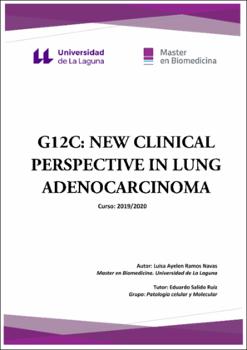G12C: New clinical perspective in Lung Adenocarcinoma
Author
Ramos Navas, Luisa AyelenDate
2021Abstract
KRAS activating mutations are among the most frequent drivers in human
cancer. However, the published series addressing the prevalence of KRAS
G12C in lung adenocarcinoma are few and controversial. The objective of
this study is to establish the prevalence of KRAS G12C mutation in lung
adenocarcinoma as well as its possible coexistence with mutations in EGFR,
ALK and BRAF. Also studying a possible morphological correlation with
mutations in KRAS.
Three hundred consecutive lung adenocarcinoma stage IIIb and IV cases
diagnosed at the Dept. Pathology, Hospital Universitario de Canarias were
included. Tumor genotyping was performed using the KRAS
pyrosequencing kit (Qiagen).
KRAS was mutated in approximately 35% of cases, being KRAS G12C the
most frequent mutation. Mutated adenocarcinomas of KRAS could be seen
also carrying mutations in EGFR or BRAF V600E. However, none was
associated with ALK translocation. Therefore, KRAS mutations do not
appear to be mutually exclusive with EGFR or BRAF mutations.
No statistically significant association between histology subtypes of lung
adenocarcinoma and mutations in KRAS was found, not even the mucinous
phenotype, which has been suggested to harbor KRAS mutations in a higher
proportion (p=0,318).
Due to the recent development of KRAS inhibitors, it seems necessary to
genotype KRAS in lung adenocarcinomas using protocols that can
distinguish specific alleles since the therapy currently in clinical trials is
mutation-specific. Pyrosequencing is a simple, low-cost and fast genopyting
method for this purpose.





